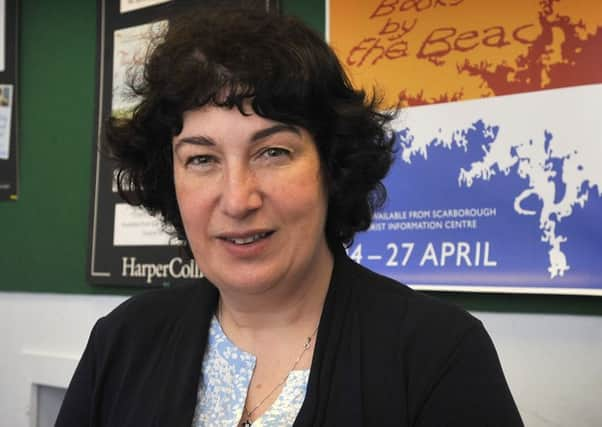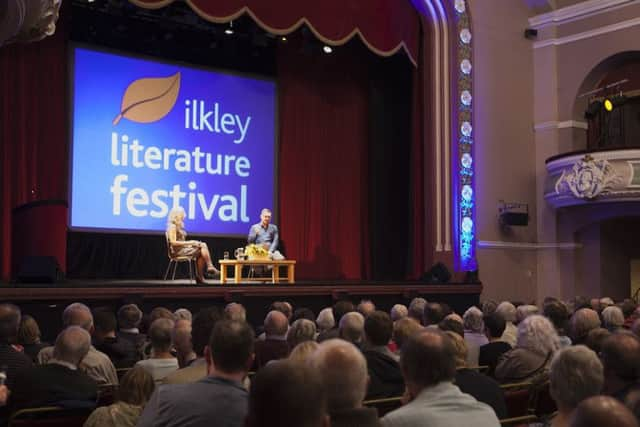Too big for their books? The rise of Yorkshire's literature festivals


FOR many people the sight of daffodils emerging from their winter sleep or lambs gamboling in the fields is a sign that spring is on its way.
But for others it’s the start of the literary festival season that heralds its arrival. March has already seen York Literature Festival, Huddersfield Literature Festival and Headingley LitFest get underway, bringing with them a string of well known names including Val McDermid, Joanne Harris and Ken Livingstone.
Advertisement
Hide AdAdvertisement
Hide AdYorkshire, of course, has a rich tradition when it comes to book festivals. Ilkley Literature Festival has been going since 1973, when it was launched by the great W H Auden, then there’s the likes of Off The Shelf, Sheffield’s Festival of Words, and the Theakstons Old Peculier Crime Writing Festival in Harrogate - now Europe’s biggest crime writing event.


They have been joined in the last four years by Raworths Harrogate Literature Festival, Leeds Big Bookend and Bradford Literature Festival, adding their names to the estimated 350 literature festivals now dotted around the country, a figure that is rising all the time.
But despite their undoubted popularity among bibliophiles of all ages, there are some concerns about the sustainability of these events and whether everyone is sharing in their success.
In January, Philip Pullman, author of the His Dark Materials trilogy, resigned as a patron of the Oxford Literary Festival over its failure to pay guest speakers. Pullman said he could no longer be a patron of a festival which didn’t pay authors for their time. It provoked a public outcry and the Oxford event subsequently said it was looking at how they might pay fees to all speakers in 2017.
Advertisement
Hide AdAdvertisement
Hide AdPullman’s decision came as the Society of Authors highlighted a survey claiming that the average income of a professional author was now just £11,000, with only 11.5 per cent of UK writers making a living solely from writing.


Nicola Solomon, chief executive the Society of Authors, says that literature festivals have become hugely popular in recent years and believes authors should be sharing in this success.
“Everybody gets something out of them - the public, the volunteers and organisers and the authors. We just need to make sure the balance of how they are paid for is right. We don’t want to see ticket prices go through the roof,” she says. “We all want literature festivals to thrive but not at the expense of authors.”
One of the issues that has caused concern are so-called ‘exclusivity’ clauses which forbid authors from taking part in other events within a particular time frame or area. Joanne Harris, author of best-selling novel Chocolat, pulled out of a books festival for the first time due to the demands of the festival organisers.
Advertisement
Hide AdAdvertisement
Hide AdHarris is a hugely popular figure and her events attract big crowds, but she is concerned by the direction some festivals appear to be heading in. “Some of the larger ones seem to be swinging too far towards being platforms for TV celebrities. A lot of the budget [of festivals] is going on them and other authors are getting less and in some cases they aren’t getting paid at all,” she says.
It’s an issue the Barnsley-born writer feels strongly about. “I’m not doing this for me, I can afford to do events for free and I do sometimes if it’s for charity or something like that. But I know some authors that don’t make a lot of money and have had to turn down offers because they can’t afford it.”
She points out that when you take into account travel costs and an overnight stay these festivals can become unfeasible. “Some writers struggle to make ends meet so why would they do it for the privilege of selling half a dozen books which can happen to first time novelists.”
Nevertheless, Harris is still a fan of book festivals. “I think the fact that literature festivals are on the rise is wonderful for literacy and it’s wonderful for the public and we need them. But speaking as an author I think we need some festivals to acknowledge that they need us and that they should be paying everyone, whether it’s a big hitter or a first time writer.”
Advertisement
Hide AdAdvertisement
Hide AdIlkley Literature Festival Director Rachel Feldberg is well aware of the contentious issue surrounding speakers. “Poets doing readings are paid by us, writers giving master classes are paid by us and if an author isn’t on a book tour then we always pay them.”
But she believes that festivals shouldn’t have to foot the bill when it’s a big name author on a promotional book tour. “That’s a friendly conversation to be had with the major publishing houses,” she says.
When it comes to the sensitive question of how much authors should get paid, Feldberg believes there ought to be some kind of sliding scale that reflects their box office appeal.
However, there are some authors, like the late Richard Hoggart, who waive their fees. “We offered him a fee but he didn’t want one and when we asked him what he wanted he just said, ‘a curd tart from Betty’s.’”
Advertisement
Hide AdAdvertisement
Hide AdThe question of paying authors can be particularly difficult for some smaller literature festivals that are run by volunteers on a shoestring budget. “We would love to pay everybody but we can’t afford to, and if we can’t pay an author we’re up front about it,” says Fiona Gell, who co-founded Leeds Big Bookend.
The festival, which returns this summer, was set up in 2012 to fill what Gell and others felt was a gap in the city’s cultural life.
“We’re much more grounded in the local community and I think that’s one of the reasons why we’ve been successful,” she says. “We try and provide a platform for writers who might not be big names now but might be in the future.”
The fact the festival is still going is testament not only to its popularity, but also to the volunteers who work tirelessly to make it happen.
Advertisement
Hide AdAdvertisement
Hide Ad“We’re proud that we come at literature festivals from a different angle because it’s not just about getting big names and charging a lot for tickets. We can’t do that and we don’t, but we’re still able to put on some great events.”
But what about the long term future of book festivals and literary events? Rachel Feldberg believes it’s a bright one. “Some people say there are far too many literary festivals and that they aren’t sustainable, but I think it’s very exciting,” she says.
“Our region is incredibly rich in terms of theatre but people don’t say we have too many of them, and it’s the same with literature festivals. We are blessed to have such distinctive and interesting festivals.”
Gell agrees and feels that these festivals, both large and small, can happily co-exist. “There’s this great appetite right now for these kind of festivals and this inter-active experience and it’s growing and I think it will continue to grow.”
Lit Fests: What to look out for in 2016
Advertisement
Hide AdAdvertisement
Hide AdBradford Literature Festival: May 20 - 29. Since its launch in 2014 the festival has grown dramatically. This year’s festival has more than 200 events featuring renowned speakers, artists and authors.
Leeds Big Bookend: Held mostly on the weekend of June 4/5, this small-scale, but popular festival is rooted in community events.
Off The Shelf: Oct 8 - 29, Sheffield’s Festival of Words brings a wide range of guest speakers to the city to discuss all manner of subjects.
Ilkley Literature Festival: Sept 30 - Oct 16. Dating back to 1973 when it was first launched, Ilkley is home to one of the biggest and most popular literature festivals in the country. Over the years its guest have included Alan Bennett, Michael Palin, Brian Blessed and W H Auden.